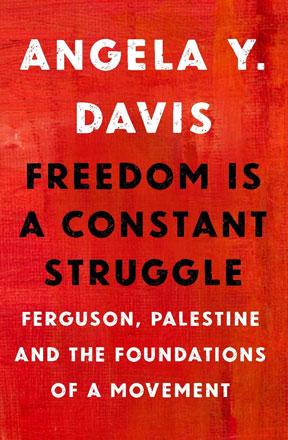You are here
Making connections
By Sally Bland - Mar 05,2017 - Last updated at Mar 05,2017

Freedom is a Constant Struggle: Ferguson, Palestine and the Foundations of a Movement
Angela Y. Davis
Chicago: Haymarket Books, 2016
Pp. 158
This book is a compilation of ten interviews and lectures by the renowned activist and scholar of the black liberation movement, Angela Davis. Delivered between the years 2013-15, at different universities and cities in the US, UK and Turkey, each interview or lecture has its own focus and flavour, but there are common themes throughout. Chief among these is that political and social change is brought about by people’s movements, not individuals, and that such movements are connected.
Davis gives many examples of the first point. While acknowledging Martin Luther King as the leader of the US civil rights movement, deserving of all the respect that has accrued to him, she writes, “in my opinion his greatness resided precisely in the fact that he learned from a collective movement.” (p. 118)
The Montgomery bus boycott, which propelled him to fame, was initiated and sustained by hundreds of black, female, domestic workers who refused to ride the buses if they had to sit in the back.
A more recent example is the presidency of Barack Obama, who was elected as the result of a mass movement, but did not live up to expectations, because “that movement did not continue to wield that collective power as pressure that might have compelled Obama to move in more progressive directions [for example, against a military surge in Afghanistan, towards swift dismantling of… Guantanamo, towards a stronger health care plan]”. (p. 3)
Only movements can force reluctant politicians to make changes.
While affirming the gains of the civil rights movement, Davis stresses that attaining legal rights did not eliminate racism, as evidenced by the ongoing poverty, imprisonment and police killings that disproportionately affect people of colour: “there are more black people incarcerated and directly under the control of correctional agencies in the second decade of the twenty-first century than there were enslaved in 1850.” (p. 122)
Native Americans have an even higher rate of incarceration.
A key term in Davis’s analysis is intersectionality or interconnectivity, an approach developed by the black feminist movement asserting that the issues of race, gender and class cannot be viewed separately. Such understanding also makes the connection between struggles against racism in the US and globally, as happened in Ferguson, Missouri, in 2014. When protests erupted after the police killing of Michael Brown, the local police force faced them with weapons and technology formerly used only in overseas wars. “The militarisation of the police leads us to think about Israel and the militarisation of the police there”. (p. 14)
In the US, this “has been accomplished in part with the aid of the Israeli government, which has been sharing its training with police forces all over the country since … 9/11.” (p. 139)
Thus, Davis argues, “when we try to organise campaigns in solidarity with Palestine… it’s not simply about focusing our struggles elsewhere… It also has to do with what happens in US communities”. (p. 15)
The connection highlighted by Davis was spontaneously made in the field: Palestinian-Americans joined the Ferguson protests, pro-Palestine slogans were raised, and activists in the West Bank and Gaza tweeted advice to Ferguson on how to deal with tear gas.
Davis’s advocacy of the BDS campaign is also based on interconnectivity. She zooms in on G4S, the third-largest private corporation in the world, which “has learned how to profit from racism, anti-immigrant practices, and from technologies of punishment in Israel and throughout the world.” (p. 5)
One of G4S’s subsidiaries is a private prison company in the US, a sector which has become increasingly profitable with privatisation, leading Davis, among others, to speak of the prison-industrial complex.
The injustice and unworkability of mass incarceration is a key issue for Davis. Just as imprisonment in Palestine aims to deflect the anti-occupation struggle, so in the US, “imprisonment is increasingly used as a strategy of deflection of the underlying social problems — racism, poverty, unemployment, lack of education, and so on. These issues are never seriously addressed. It is only a matter of time before people begin to realise that the prison is a false solution,” and begin “imagining a very different form of security in the future.” (pp. 6, 48)
Forging collective solidarity can be an antidote to “the individualism within which we are ensconced in this neoliberal era… It is in collectivities that we find reservoirs of hope and optimism.” (p. 137)
In view of the current situation in the US, Davis’s book has added relevance, stressing, as it does, the resistance power of inclusive popular movements.
Related Articles
Black Power and Palestine: Transnational Countries of ColourMichael R. FischbachCalifornia: Stanford University Press, 2019Pp.
What he means is that they are winning the battle of ideas with Zionism. More and more people are recognising the legitimacy of the Palestinians’ quest for their rights, even as Israel’s ongoing occupation, racism, human rights violations and war crimes chip away at its legitimacy. The terms of the debate have changed in a way conducive to Palestinians advancing their right to self-determination.
Ferguson, United States — The racial flashpoint city of Ferguson awoke under a state of emergency Tuesday after a second night of clashes be














